
Ichi the Killer is a 2001 Japanese horror yakuza film directed by Takashi Miike, written by Sakichi Sato, and starring Tadanobu Asano and Nao Omori. Based on Hideo Yamamoto's manga series of the same name, its plot follows a psychologically damaged man who is manipulated into assaulting or killing rival faction members of feuding yakuza gangs while being pursued by a sadomasochistic enforcer.

Dear Brother is a Japanese manga series by Riyoko Ikeda. It was adapted into an anime series that aired on the channel NHK-BS2 from July 14, 1991 to May 31, 1992.

Dead or Alive, abbreviated as DOA, is a 1999 Japanese yakuza action film directed by Takashi Miike. It stars Riki Takeuchi as the gang boss and former yakuza Ryūichi and Show Aikawa as the Japanese cop Detective Jojima and focuses on their meeting and conflict. It is the first in a loosely-connected three-part series, followed by Dead or Alive 2: Birds in 2000 and Dead or Alive: Final in 2002.

Duel at Ichijoji Temple is a 1955 Japanese film directed by Hiroshi Inagaki starring Toshiro Mifune. Shot in Eastmancolor, it is the second film of Inagaki's Samurai Trilogy.
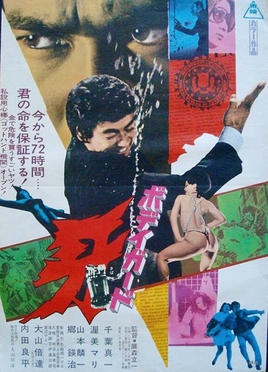
Karate Kiba or Bodyguard Kiba (ボディガード牙) is a 1973 Japanese martial arts film starring Sonny Chiba. It is based on an action manga by Ikki Kajiwara.

Full Metal Yakuza is a 1997 Japanese tokusatsu action film directed by Takashi Miike. It was written by Itaru Era and based on a story by Hiroki Yamaguchi.

Fudoh: The New Generation is a 1996 Japanese movie directed by Takashi Miike. It is based on an unfinished manga series by Hitoshi Tanimura. Two sequels followed, neither of which were directed by Miike.
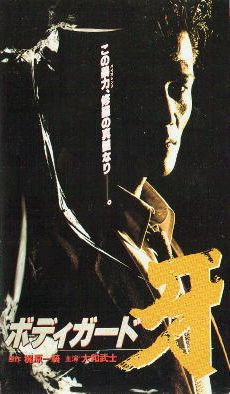
Bodyguard Kiba is a 1993 Japanese martial arts/action film directed by Takashi Miike.

The Geisha House is a 1998 film directed by Kinji Fukasaku.
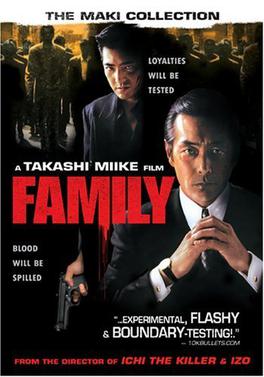
Family is a 2001 Japanese yakuza film directed by Takashi Miike. This film together with its sequel Family 2 comprise the complete Family saga.

The Way to Fight is a 1996 Japanese film directed by Takashi Miike. The film is based on Seijun Ninomiya's novel of the same name, a fictionalized account on the lives of Hidekazu Akai and Akira Maeda.

Young Thugs: Innocent Blood is a 1997 Japanese film directed by Takashi Miike. It is based on the autobiographical novel Kishiwada shōnen gurentai: Chikemuri junjō-hen written by Riichi Nakaba. It is the sequel to the 1996 film Boys Be Ambitious and is followed by the 1998 prequel film Young Thugs: Nostalgia.

Kamen Rider: The Next is a 2007 Japanese tokusatsu superhero film directed by Ryuta Tasaki and written by Toshiki Inoue. The film was released on October 27, 2007. The film borrows elements from the Kamen Rider V3 television series and is a sequel to the Kamen Rider: The First movie.

Japan participated in the 2010 Asian Games in Guangzhou, China on 12–27 November 2010.

The Lion Standing in the Wind is a 2015 Japanese drama film directed by Takashi Miike. It was released on March 14, 2015. It is based on the true story of a Japanese doctor working in Africa using information from letters sent home to the girl he left behind in Japan. The letters originally formed the basis for the popular 1987 Japanese song "Kaze ni Tatsu Lion" by Masashi Sada, who was encouraged by actor Takao Osawa to adapt the song into a novel. The novel was released in 2013 and was later adapted into the 2015 film directed by Takashi Miike.

Bodyguard Kiba: Apocalypse of Carnage, also known as Bodyguard Kiba 2: Combat Apocalypse or simply Bodyguard Kiba 2, is a 1994 Japanese direct-to-video martial arts/action film directed by Takashi Miike. It is the sequel to the 1993 film Bodyguard Kiba and is followed by Bodyguard Kiba: Apocalypse of Carnage 2 (1995), the final part of the trilogy.
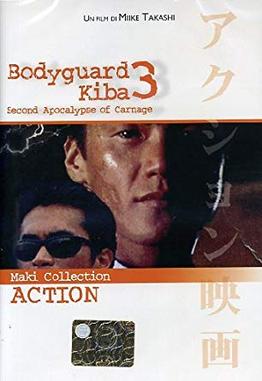
Bodyguard Kiba: Apocalypse of Carnage 2, also known as Bodyguard Kiba 3: Second Apocalypse of Carnage, Bodyguard Kiba: Combat Apocalypse 2, or simply Bodyguard Kiba 3, is a 1995 Japanese direct-to-video martial arts/action film directed by Takashi Miike. It is the final part of Miike's Bodyguard Kiba trilogy, following the 1993 film Bodyguard Kiba and the 1994 film Bodyguard Kiba: Apocalypse of Carnage.
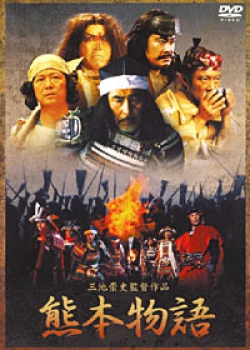
Kumamoto Stories is a Japanese historical anthology film directed by Takashi Miike. Released on DVD on July 20, 2002, it contains three short films produced between 1998 and 2002 presenting legends about the history of Kumamoto Prefecture.
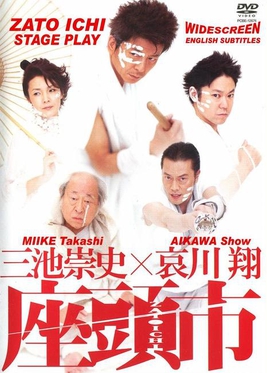
Miike Takashi × Aikawa Show: Zatoichi, also known as Zatoichi Live, is a filmed stage production of Zatoichi, a play co-written by Takashi Miike and Masa Nakamura based on the character created by Kan Shimozawa. It was Miike's second filmed stage production, following Demon Pond in 2005. The stage production was performed and filmed on December 12, 2007, and the DVD was released on May 30, 2008.


















